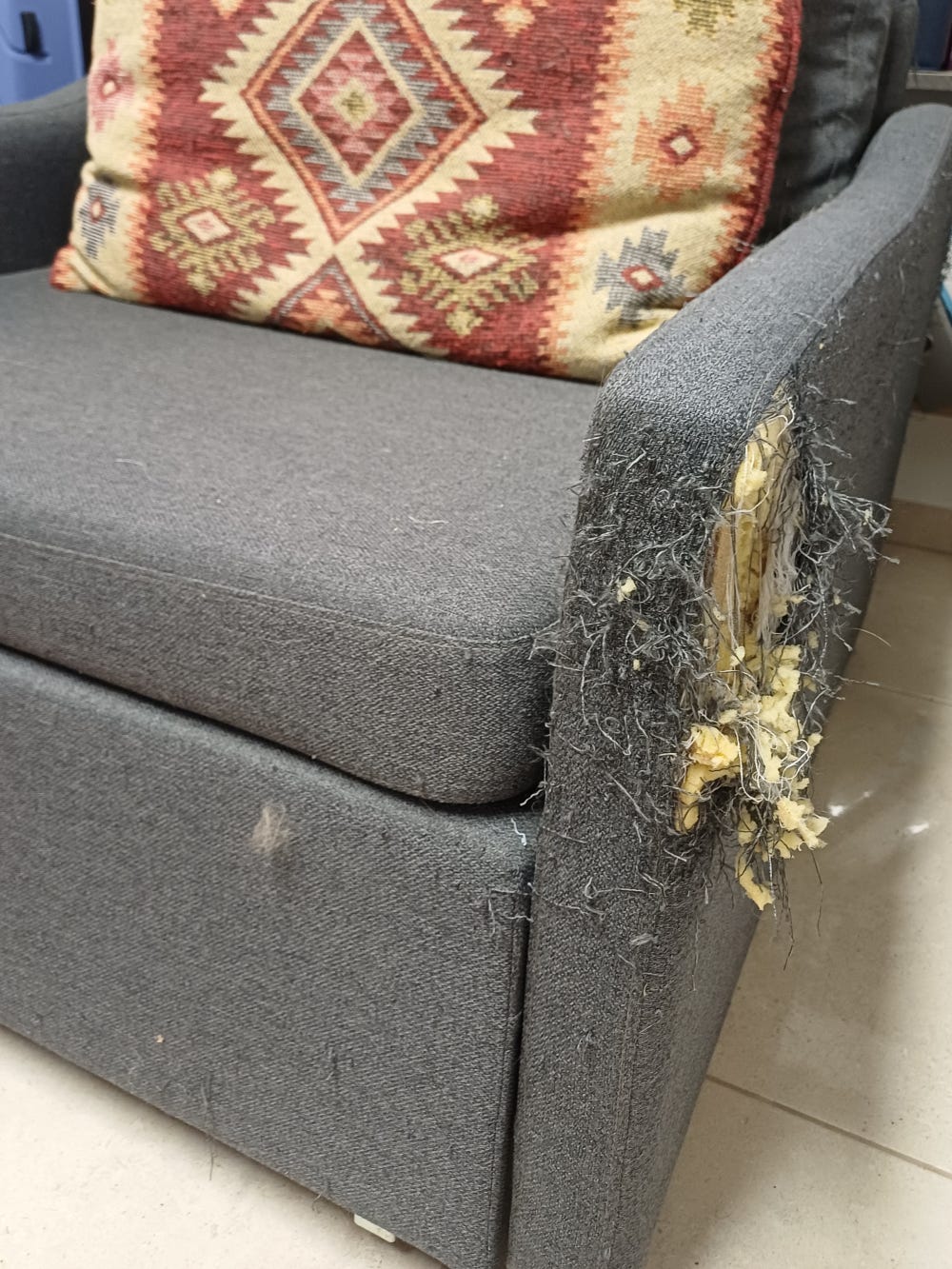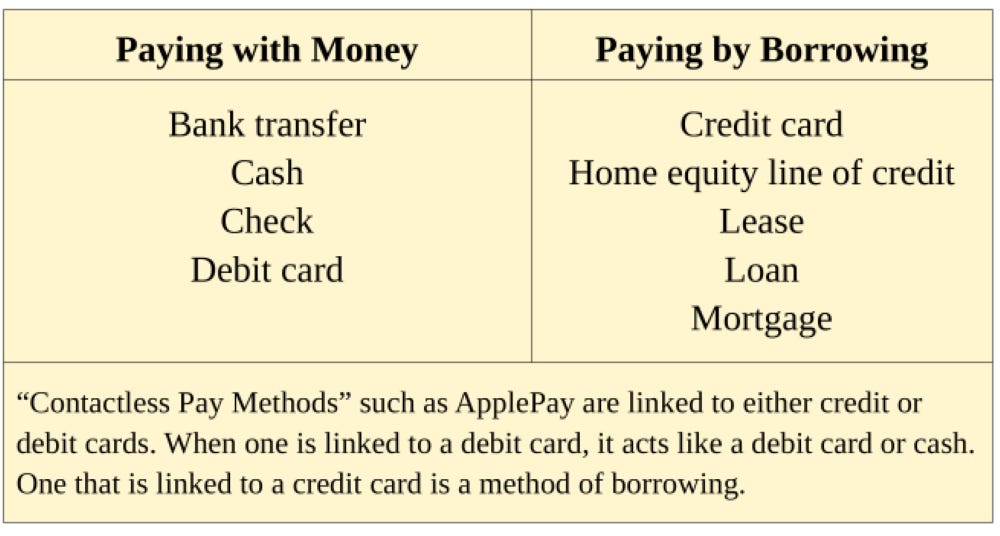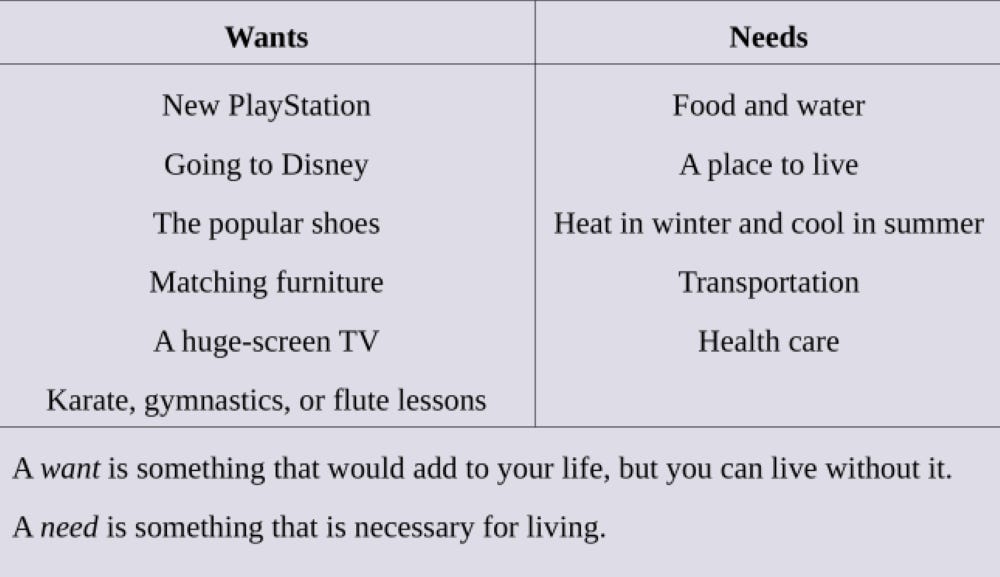What's Important?
Focusing on needs, not wants...why it matters. For kids 10-16
Momo was 35 years old when he left his home in the African country of Chad in the middle of the night. He filled his ancient car with gas, took two cans filled with gasoline, an old backpack with a couple of changes of clothes, his laptop, and a little food and water, and took off. He drove through the night. When he got to a village near the border, it was dawn. Momo took off his city clothes and put on the clothes he wore when he visited his family in a village like this one, but far away.
It was market day, and buyers and sellers were already at the market. He traded his car for a donkey and followed directions to a path that, he was told, would take him to the border with the next country. He could cross over on a little-known path. No one would know.
He knew that if anyone found him, they might kill him. Two friends had been killed and another had disappeared because they were Christian journalists. Radical Muslims were killing Christians and they didn’t want people to know. Getting rid of journalists was one of their ways of keeping their activities secret.
Momo was scared, but he knew if he got to the big city, journalists there would help him. He used the last of his money to buy food for himself and the donkey, and he set off.
Two days later he was safer, but he couldn’t stay where he was. He went to the U.S. embassy and told his story to an officer there. He had lots of information to prove that his life was in danger, so he was permitted to go to the USA legally.
In the USA, Momo got a job as a janitor in an elementary school. At the beginning of the next semester, Momo enrolled in a community college program. He wanted to learn enough English to go to college and get an American college degree so that he could get a good job.
When the semester started, Momo was in the class I taught. Students in the class were mostly a lot younger than him. None of them came from Africa. He didn’t know Americans, and he was lonely. I was one of the first white American adults that he talked to. Sometimes he stayed after class to ask me questions. Sometimes he stayed just to chat.
Momo’s Ideas About the USA
One day Momo said, “America isn’t like I thought it would be. It is true, everyone has lots of things. Big, fancy houses. Cars that are so new that they still work right, without needing to be fixed every few weeks. Fancy cell phones. More things than I could ever imagine. But Americans are poorer than the poorest people in Africa.”
I asked what he meant. He said, “People from my church have invited me to their homes for dinner. Each time we sit in a beautiful room that is just for eating. There is a big table and chairs that match, and everything looks like pictures in fancy magazines. There is plenty of good food. Everyone has nice clothes.
“But the people are not happy. People talk about problems and about everything that is wrong in their lives.
I grew up in a grass hut in a tiny village. The hut was one big room with a dirt floor. We didn’t have a lot of choices. We ate the same thing day after day because our food depended on the growing season. But we were always glad to see each other. We laughed and joked and talked about happy things. Sure, bad things happened. Bad things happen to everyone. But we thought about and talked about the good things. We helped each other, not just family but in the village.” He paused, a long pause. Then he said, “We were richer than Americans.”
What Matters to You
What matters to you? Do you need the same kind of jeans as other kids you know? Do you talk with your friends about the latest, greatest video games, seeing the newest movies, and taking the nicest vacations? Do you gossip about kids who can’t or don’t do those things? It’s easier to follow the crowd. Sometimes, though, what everyone else is saying, buying, or doing is leads you on a path that, deep in your heart, you really don’t want to take.
Instagram and other social media programs are full of pictures of beautiful places and things. It’s easy to think everyone else’s life is beautiful. No one publishes pictures of the chair that their cat scratched to bits, or their dad’s 18-
year old Hyundai. The truth is, though, lots of folks—maybe most—live with old and worn-out stuff. It’s easy to get confused and to think that the beautiful Insta photos are reality. They aren’t reality for most people.
Getting What You Want
There are two honest ways to get things: one can pay with money one has right then, or one can borrow money to pay. (Stealing is a third way to get things you want. It is dishonest and hurts other people.)
People who borrow money so that they can have nice things look rich. But buying new things only makes someone feel good for a very short time. Soon they’ll see other beautiful, trendy or fun things on Instagram or other social media, and they‘ll want them.
One big problem with this is that they actually do not own the things they have. Whether they use credit cards or other kinds of borrowing, the credit card company or bank owns the things. If they can’t pay, they will lose their things. Proverbs 22:7 describes it this way: “A rich man will rule over the poor, and a borrower is a slave to a lender.i”
Here are examples of what that means.
If you can’t pay your car payment, the car will be repo’d, or repossessed. That means whoever lent you the money for the car takes it back. They sell it for a low price, and then you have to pay the difference between what you owed and the price they got when they sold it again.
When you can’t pay for your house, the bank forecloses on it. Like a repo, the bank or whoever lent you the money takes it back and sells it to someone else.
Sometimes people decide that the tension of having to pay all their credit bills is terrible. They get so tired of owing money—of being slaves to the lenders—that they decide to pay off all their debt. To do this, they usually “tighten their belts.” That is, they go on a spending diet. They stop buying things they don’t absolutely need. They use the money they save to pay off their current debts. Things they stop buying often include:
kids’ athletic and dance classes
music lessons
new clothes
steak, fancy coffee, and ice cream
take-out food
They might stop going to:
professional sports events
movies and theater programs
vacations
restaurants
And they might start working a second or even a third job to make more money.
How To Stop Spending
When a family decides to pay off their debt, one of the first things they need to do is stop spending so much. This means deciding what is a need and what is a want.
When you stop thinking about having the newest and best, you learn to be content with what you have. You start to realize that new stuff isn’t very important. What other people think isn’t important, either.
In general, Americans who do not owe money live simpler lives than people who live with debt. Even when emergencies happen, people who do not use debt are okay because they have put aside money, sometimes just a little bit every month until they have a sizeable emergency fund. Then when things suddenly go wrong—which they will do—they have money to pay for them.
Because they don’t have bills, they never have bill collectors calling them asking for money. They don’t lie awake at night and worry how they’re going to pay the electric bill because they have a big emergency fund.
If Stuff Isn’t Important, What Is?
“One who is slow to anger is better than a mighty man, and one who rules over his spirit [is better] than one who conquers a city,” according to Proverbs 16:32. Pirke Avot 4:16 speaks of a good name: “Rabbi Shimon would say: There are three crowns—the crown of Torah, the crown of priesthood and the crown of sovereignty—but the crown of good name surmounts them all.” Not every Jewish person can be a priest—that is reserved for Cohanim. But everyone can learn Torah, which teaches behavior, and everyone can work to have a good name. Here are some ways:
Develop a good character:
tell the truth
don’t gossip about others
help others
visit the sick or send them get-well cards or funny texts
Be generous with time
Be generous with money
Be grateful for what you have—even simple things like enough food, a clean house, or comfortable shoes. Be grateful for what others do for you. And even if you get angry at God because of hurtful things in your life, you can still be grateful to Him for creating the world.
Thinking, doing, and learning to do these things will help you get along better with the people in your family as well as other people. It feels good to know you’ve helped someone else.
Of course, everyone makes mistakes, feeling envy, sadness, and anger sometimes. But unlike a new toy that you might love for a moment but which gets boring soon, striving to have a good character gives you lots of moments to remember with gratitude and joy.
So What’s Important About Momo’s Story?
Momo’s story shows a picture of life with almost no possessions, but filled with love and happiness. It reminds us what really matters, and that’s not the latest and greatest.
Pirke Avot also tells us that these things matterii:
Simon the Just… used to say, “Upon three things the world stands: on Torah, on Serving God, and on Deeds of Lovingkindness.” (Pirke Avot 1:2)
Hillel used to say, “If I am not for myself, who will be for me? And if I am only for myself, what am I? And if not now, when?” (Pirke Avot 1:14)
What Can A Kid Do?
Children can’t pay off debt or convince their parents to change their lives. They can’t convince parents to stay married or make their cousin stop teasing them. What they can do is change their own behavior.
You can choose to treat your family the way Momo’s family treated each other: with love, gratitude and caring.
Be patient with your brothers and sisters.
If a sibling messes up your things, you probably get mad at him or her. Instead, find a better way to store your things so that the pest can’t get into them.
Get in the habit of doing your chores without being asked.
Get a little notebook and every night before bed write down three or five good things that happened that day. This is especially important to do after a bad day or if your family situation is difficult. It trains you to be a positive person and not think of yourself as a victim.
If your friends encourage you to do things that you know aren’t right, find better friends.
Today is the best time to start: If not now, when?
For parents, teachers, and others
I’ve been debt-free and have not had a credit card since 2010, and it has given me a great sense of peace. Here’s some background information that you might find interesting.
Credit cards can be paid off monthly, but research shows that only 40-45% of Americans pay off their credit cards every month.iii The rest pay interest on the balance. This interest averages 23%. Interest is money paid to the lender for the use of the money.
Paying off debt can take a long or short time, depending on how much debt, what their income is, and how deeply they cut into their expenses. A plan like the Ramsey Baby Steps helps people pay off debt.
The months and years people spend paying off debt can be difficult. Children can be bullied when they don’t have new clothes and can’t participate in after-school programs. Adults say things like, “Spend what you have, you only live once (YOLO).” By the time all the debt is paid, though, the family has learned to control their spending. They only buy what they have money for, they have savings, and they don’t worry about paying bills anymore.
They are no longer enslaved to the credit card company, student loan company, or bank. They are financially free.
i https://www.chabad.org/library/bible_cdo/aid/16393/jewish/Chapter-22.htm
ii https://studylib.net/doc/9033258/ten-quotes-from-pirke-avot
iii https://libertystreeteconomics.newyorkfed.org/2025/03/why-are-credit-card-rates-so-high/






Very wonderful, Hanna. This is important for kids to begin understanding. You successfully accounted this in your article.